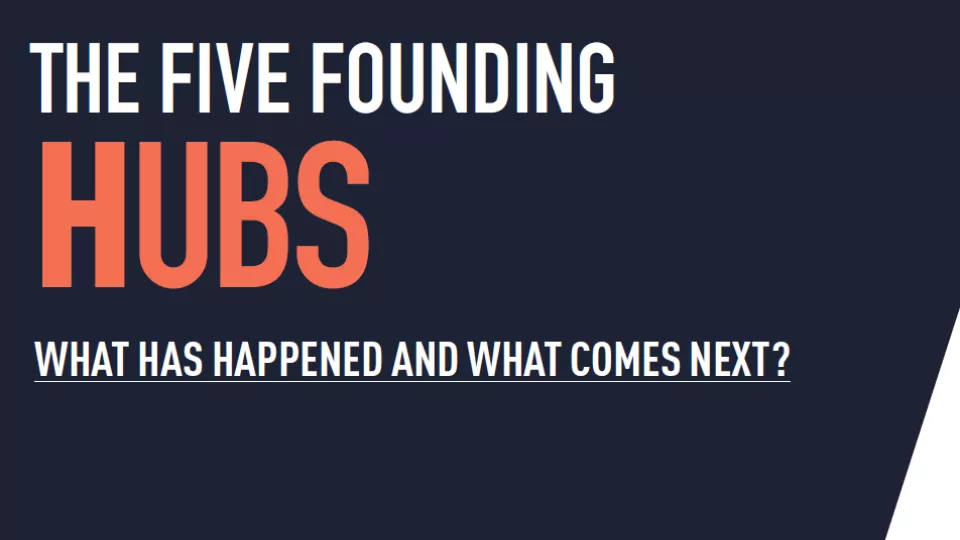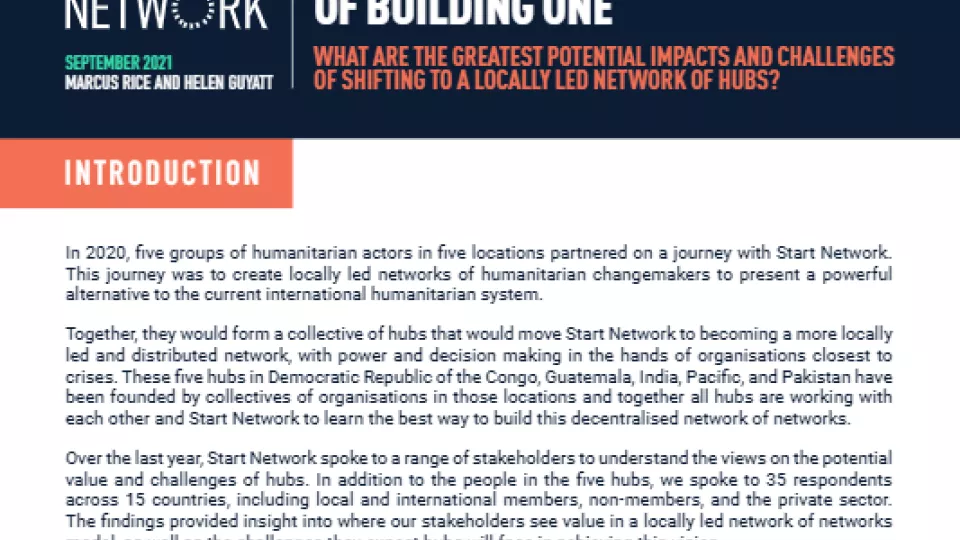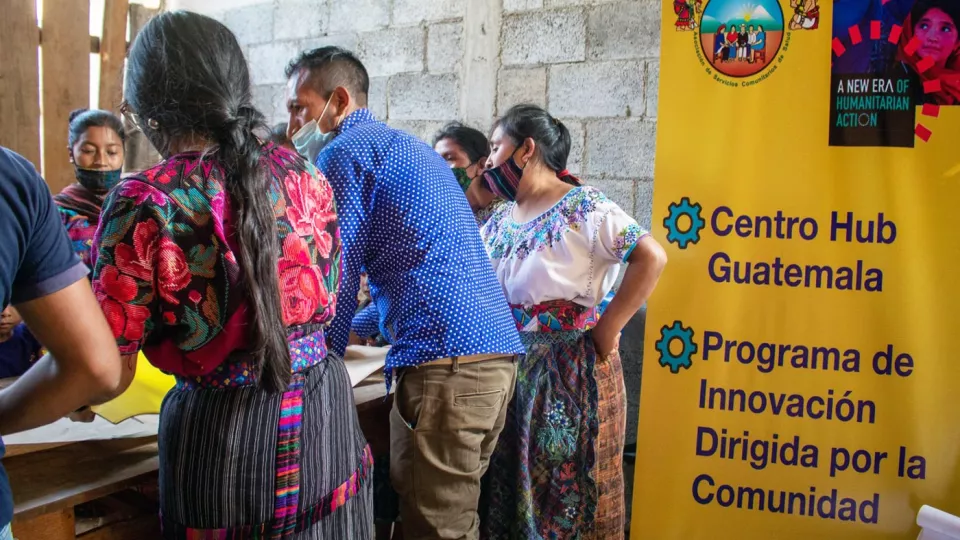
Search


DRC Hub Paves the Way for a New Era of Humanitarian Action
The General Assembly of the Start Network Hub in the Democratic Republic of the Congo took place from 09 to 12 November 2021 and was attended by 40 delegates from the provincial governments of North and South Kivu, the central government, international, national and local NGOs, research institutions and universities, as well as members of Start Network’s team.

Founding Hubs
In April 2020, five locally led groups of changemakers came together to explore what it takes to launch local hubs as part of Start Network, as envisioned within ‘Start Evolves’. This phase was called a ‘Proof of Concept’ and has resulted in the emergence of Hubs in the Democratic Republic of Congo, Guatemala, India, the Pacific Region and Pakistan.

EL VALOR DE UNA RED DIRIGIDA A NIVEL LOCAL Y LOS DESAFÍOS DE CONSTRUIRLA
En el año 2020, cinco grupos de actores humanitarios se asociaron en un viaje con Start Network en cinco localidades. Este viaje se hizo para crear redes dirigidas a nivel local de agentes de cambio humanitario para presentar una alternativa poderosa al actual sistema humanitario internacional. Todos juntos forman un colectivo de hubs que ayudarían a Start Network a convertirse en una red más dirigida y distribuida a nivel local, con el poder y la toma de decisiones en manos de organizaciones más cercanas a las crisis. Estos cinco hubs ubicados en la República Democrática del Congo , Guatemala, India, Pacífico y Pakistán fueron fundados por colectivos de organizaciones en esos lugares y, juntos, están trabajando entre ellos y con Start Network para encontrar la mejor forma de construir esta red descentralizada de redes. Durante el último año, Start Network habló con varias partes interesadas para entender los puntos de vista sobre el valor y los desafíos potenciales de los hubs. Los resultados permitieron comprender dónde nuestras partes interesadas ven el valor en un modelo de red de redes dirigida a un nivel local, así como también los desafíos que esperan que enfrenten los hubs al alcanzar esta visión. Este documento se publicará como parte de los objetivos de Start Network para crear un sistema más equilibrado que acerque lo más posible el poder y la toma de decisiones a la primera línea.

LA VALEUR D’UN RÉSEAU DIRIGÉ LOCALEMENT ET LES DÉFIS POUR SA CRÉATION
En 2020, cinq groupes d’acteurs humanitaires dans cinq endroits se sont associés pour un voyage avec Start Network. Ce voyage avait pour but de créer des réseaux de faiseurs de changement humanitaire dirigés localement afin de présenter une alternative puissante au système humanitaire international actuel. Ensemble, ils formeraient un collectif de hubs qui permettraient à Start Network de devenir un réseau plus dirigé et distribué localement, le pouvoir et la prise de décision étant entre les mains des organisations les plus proches des crises. Ces cinq hubs en république démocratique du congo, au guatemala, en inde, dans le pacifique et au pakistan ont été fondés par des collectifs d’organisations dans ces endroits et ensemble, tous les hubs travaillent les uns avec les autres et avec start network pour apprendre la meilleure façon de construire ce réseau décentralisé de réseaux. Au cours de l’année dernière, start network s’est entretenu avec une série de parties prenantes pour comprendre les points de vue sur la valeur et les défis potentiels des hubs. Les résultats ont permis de mieux comprendre où nos parties prenantes voient la valeur d’un modèle de réseau de réseaux dirigé localement, ainsi que les défis auxquels ils s’attendent à ce que les hubs soient confrontés à la réalisation de cette vision. Ce document est publié dans le cadre des objectifs de start network visant à créer un système plus équilibré qui transfère le pouvoir et la prise de décision aux personnes les plus proches de la ligne de front.

THE VALUE OF A LOCALLY LED NETWORK AND THE CHALLENGES OF BUILDING ONE
In 2020, five groups of humanitarian actors in five locations partnered on a journey with Start Network. This journey was to create locally led networks of humanitarian changemakers to present a powerful alternative to the current international humanitarian system. Together, they would form a collective of hubs that would move Start Network to becoming a more locally led and distributed network, with power and decision making in the hands of organisations closest to crises. These five hubs in DRC, Guatemala, India, Pacific, and Pakistan have been founded by collectives of organisations in those locations and together all hubs are working with each other and Start Network to learn the best way to build this decentralised network of networks. Over the last year, Start Network spoke to a range of stakeholders to understand the views on the potential value and challenges of hubs. The findings provided insight into where our stakeholders see value in a locally led network of networks model, as well as the challenges they expect hubs will face in achieving this vision.

How local leaders are challenging the status quo — and Start Network
As part of our move toward becoming a locally led network of networks, we've incubated and supported five Start Network hubs. Bhavya Srinivasan, Interim Head of Network Development, shares what she's learned in the two years she's worked to support them.

UK Aid provides £12m to support the Start Fund
The UK’s Foreign, Commonwealth and Development Office (FCDO) announced today that it would provide a further £12m to support the Start Fund. The funding will enable frontline actors across Start Network’s members and partners to continue to respond rapidly to and in anticipation of under-the-radar humanitarian crises. The FCDO also agreed to work with Start Network in its transition to a global network of ‘hubs’, which will facilitate locally-led responses and improve NGO access to more innovative financing that will mitigate humanitarian impacts, both protecting and assisting people affected by crises.
Hub Proof of Concept - Six Lessons in Six Months
This paper is not an evaluation. It is an exploration of the constraints, challenges, and opportunities that have emerged during the first phase of the proof of concept.

Twelve local and national organisations become members of Start Network
Start Network is pleased to announce that 12 new local and national aid agencies, based in India, Pakistan and the Democratic Republic of Congo, have joined the network. The new members have joined as part of Start Network’s plans to build a more balanced network made up of more local and national actors.
